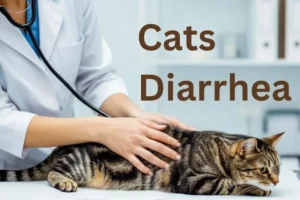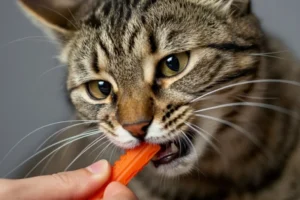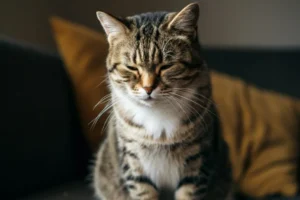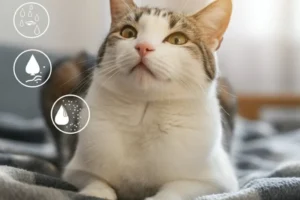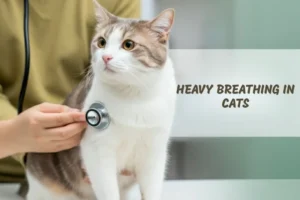
Why Is My Cat Growling in Sleep or Making Weird Noises?
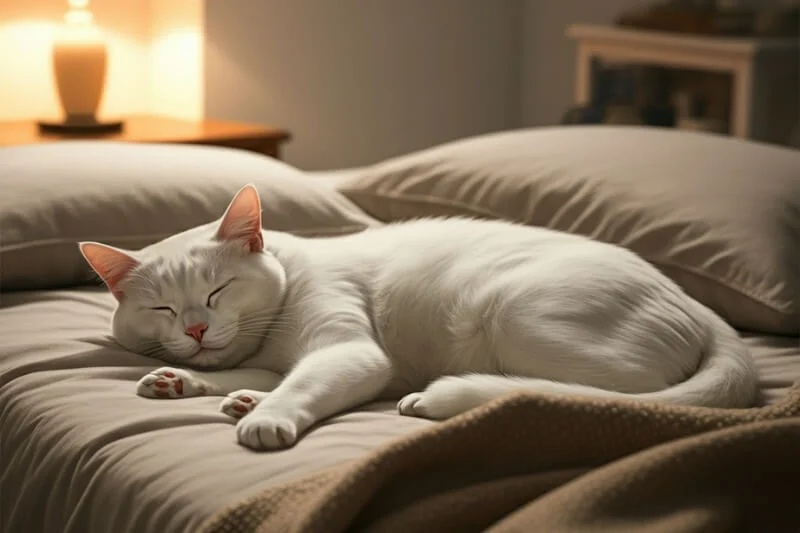
Hearing your cat let out a low growl can be startling, especially when they’re fast asleep. You might wonder if they’re in pain, having a bad dream, or if something more serious is going on. While it may be an odd behavior to witness, a cat growling in sleep can often be part of normal behavior rather than something to worry about.
This post examines the common reasons why domestic cats growl, hiss, yowl, or make unusual noises during their sleep cycle. We’ll also cover signs that may indicate a deeper issue, such as neurological problems or seizures, and when it’s time to consult your veterinarian. Understanding these vocalizations and behaviors can help you ensure your feline partner is happy, healthy, and just having some vivid dreams.
Table of Contents
Why Do Cats Growl in Sleep?
Like humans, cats experience different sleep cycles, including the phase known as deep sleep and the REM (Rapid Eye Movement) sleep cycle. This is where most dreaming and the majority of vocalization happens, and it’s not unusual for adult cats or older cats to twitch, make weird noises, or even purr and growl. Domestic cats of various cat breeds can all exhibit these behaviors at some point.
Here are some likely reasons for your cat growling in sleep:
- THEY ARE DREAMING
The most common explanation is that your cat is simply dreaming. Their brains are highly active during REM and deep sleep. They can react physically and vocally to whatever is happening in their dream world. Your feline companion might be dreaming about chasing prey, encountering a perceived threat, engaging in a playful cat nap, or replaying the social interactions of the day.
These dreams can spark a range of sounds: from purring and yowling to the occasional cat growl or hiss. Some cat owners have reported that their adult cats make vocalizations that range from a soft purr to a startling yowl during particularly active sleep cycles. The good news is that if your cat returns to normal behavior after waking up, this is usually nothing to worry about.
Dr. Emily Carter, a feline behavior specialist, explains, “Growling during sleep in cats is often a harmless indication of dreaming similar to humans. However, to rule out underlying problems, a veterinarian should be consulted if a cat exhibits dramatic behavioral changes.
- REACTING TO THEIR ENVIRONMENT
Even during a deep cat nap, domestic cats remain remarkably alert to their surroundings. A sudden loud noise, movement from other household pets, or an unfamiliar scent can trigger a reflexive cat growl or other vocalizations while the cat is still half-asleep. This is especially true for male cats, who may be more territorial and prone to vocalization as a way of communicating their presence or voicing a perceived threat, even when dozing.
It’s not unusual for a cat owner or pet parent to notice their cat shifting position, making weird noises, or yowling lightly before settling back into restful, deep sleep. This behavior is part of normal feline communication and shouldn’t be cause for alarm unless it becomes frequent or is accompanied by aggressive behavior when awake.
- PAST TRAUMA OR STRESS
For some cats, especially older cats or those rescued from stressful environments, past trauma can resurface in their dreams. Cat breeds that are naturally more sensitive can be especially prone to vivid dreams or even experiences that seem like bad dreams. A pet parent might see their cat shudder, growl, or seem distressed while sleeping. In rare cases, these behaviors might actually be mild seizures, especially if accompanied by twitching, unresponsiveness, or other unusual movements.
It’s crucial to observe closely. If your cat’s sleep cycle regularly involves distress, vocalization, or twitching, or if they seem disoriented after waking, discuss this with your veterinarian. A cat’s behavior can be complex, but your observations as a cat owner are vital.
Should I Be Worried About Cat Growling in Sleep? Signs to Watch For
A cat growling in sleep, purring, or making other odd or weird noises is usually within the range of normal behavior, especially if your pet seems otherwise happy, healthy, and active when awake. Still, your role as a pet parent involves being vigilant for warning signs that something more serious may be happening, such as seizures or severe anxiety.
According to a study in the Journal of Veterinary Behavior, “Monitoring sleep behavior in cats can provide valuable data into their overall health, with sudden changes potentially indicating stress or underlying medical conditions such as neurological issues.”
Look for these changes in your adult cats or older cats:
- Changes in Appetite or Thirst: An abrupt shift in appetite or thirst can signal a medical issue.
- Hiding or Withdrawal: Even the most social male cats may hide if they are unwell.
- Lethargy: Too much sleeping, or cat naps that last far beyond the norm, may mean your cat is sick.
- Pain or Discomfort: Growling or hissing when touched, whether awake or asleep, requires attention.
- Litter Box Issues: Behavioral shifts here are one of the earliest red flags.
- Increased Aggression: If aggressive behavior continues when awake, consult your vet.
Persistent or frequent sleep disturbances, especially if your cat’s growl turns into yowl-like outbursts, repetitive limb movements, or if you suspect seizures, warrant a professional evaluation. Whenever changes in your cat’s vocalization affect their usual sleep cycle, don’t hesitate to seek help.
When to See a Veterinarian
It’s far better to be cautious when it comes to cats’ behavior and health. A veterinarian at DialAVet advises, “If a cat’s sleep behavior changes suddenly or is accompanied by other signs of stress, illness, or discomfort, a visit to the vet is advisable.” Your vet will check for underlying issues, such as pain, neurological problems, or any other condition that could cause abnormal sleep vocalization.
A thorough examination, along with additional testing, may be necessary if your adult cats experience frequent disruptions in deep sleep, seizures, or sustained changes in their normal behavior. Remember: Not all sleep growling is caused by dreaming. A professional’s insight is always valuable.
Fostering Sweet Dreams for Your Cat
For most pet parents, the sight of a cat growling, purring, or even yowling in their sleep can be strange, but it’s usually part of the fascinating world of feline communication. Domestic cats from all cat breeds may make a variety of weird noises during sleep, and as long as their overall demeanor remains positive when awake, this is considered normal behavior.
Keep your older cat or male cats on a regular check-up schedule. Watch for any unusual cat growl patterns or sudden increases in vocalization during a cat nap or deep sleep. Support your feline companion by maintaining a stable, enriching home environment. Consistency helps minimize stress and the likelihood of a bad dream or anxiety over loud noises, turning a simple catnap into a vocal spectacle.
If you notice changes such as seizures, persistent growling, or a sudden aversion to being touched or held, contact your veterinarian for advice. A trusted cat owner who observes and responds to sleep cycle changes is the best pet parent their feline friend could hope for!
By staying informed about cats’ behavior and keeping these insights in mind, you’ll be well-equipped to interpret and respond to sleep-time vocalization. Sweet dreams to you and your feline friend!

